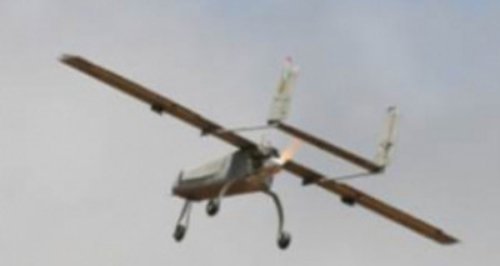Two indigenously developed unmanned aircraft systems (UAS) made their maiden flight at the Nigerian Air Force Base in Kaduna last month. The UAS are designed to enhance aerial surveillance capabilities of the Nigerian Air Force (NAF), but serial production of the system still seems far away.
Although there are no official reports providing more details about these flights, it is likely that they concerned the AMEBO III, which was unveiled at Air Expo 2012 in Kaduna. The UAV, developed by MSc students from the Air Force Institute of Technology (AFIT), is an upgraded version of the AMEBO I and II. At the Air Expo, AFIT stated that test flights for AMEBO I and II had been carried out by UK pilots in 2010 and 2011, but that a NAF pilot would perform the AMEBO III test flight.
AMEBO III could be deployed for aerial surveillance missions, operating autonomously with live video and data telemetry up to a range of 40 km. Its applications include protection of pipelines and borders, maritime control and disaster monitoring. However, the system could also be utilized for monitoring increasing Boko Haram terrorist activity in the Niger Delta and Borno State. At present, only unarmed US MQ-1B Predator UAVs, stationed in Niger, are monitoring the border of Niger-Nigeria and Cameroon-Nigeria.
AMEBO research is sponsored by the NAF with contributions from the Cranfield University in the United Kingdom. However, more funding and political support is required to develop the UAV further. Looking at the 2013 budget of NAF, amounting to $420.6 million, no significant funding seems to be available, with over half of its budget being allocated to the re-activation of a number of aircraft in the inventory, which have been mainly grounded in the period following NAF’s attempt to topple General Ibrahim Babagida’s regime.
Although the Nigerian government is committed to growing its defence industry, only $3.3 million of the $2.2 billion defence budget is allocated to Research, Development, Test & Evaluation (RDT&E). Also, taking into consideration the underdeveloped aerospace industry, co-operation with foreign companies is required to take the AMEBO project further.
According to AFIT, the project has already attracted international attention including from overseas companies looking to collaborate in research and development. Brazil, having experience in the development of UAS, could be a potential partner. The countries have held bilateral discussion on defence relations in July 2013 aiming to co-operate in the areas of military technology transfer and training of Nigerian forces.
Although there is commitment from the Nigerian government to develop its defence industry, and a requirement to enhance the NAF’s aerial capabilities with UAS, it remains to be seen if the programme will receive adequate funding to take it to the next stage.
Photo: Amebo
Source: Defence Web


Nice development by my countrys engineers.we are really doin well in d defence industrty.i luk forward to seeing us create more in country
Nice start. More grease to the working joints of the Nigerian Air Force.